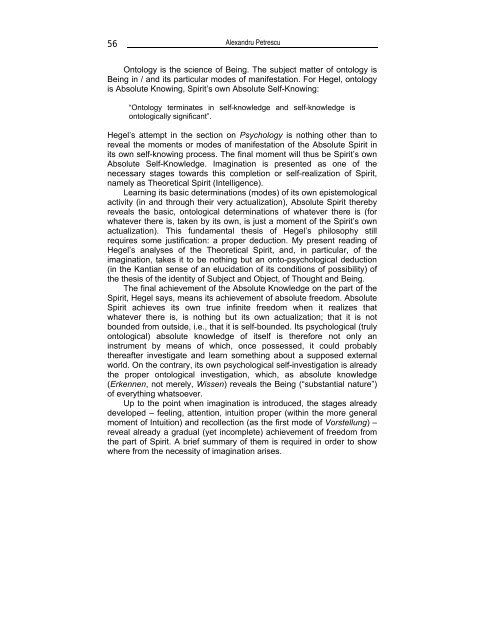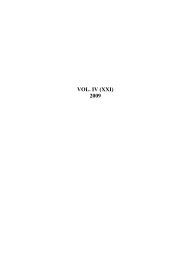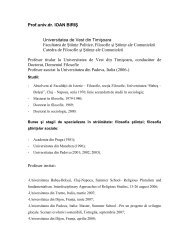analele universităţii de vest din timişoara annales universitatis ...
analele universităţii de vest din timişoara annales universitatis ...
analele universităţii de vest din timişoara annales universitatis ...
Create successful ePaper yourself
Turn your PDF publications into a flip-book with our unique Google optimized e-Paper software.
56<br />
Alexandru Petrescu<br />
Ontology is the science of Being. The subject matter of ontology is<br />
Being in / and its particular mo<strong>de</strong>s of manifestation. For Hegel, ontology<br />
is Absolute Knowing, Spirit’s own Absolute Self-Knowing:<br />
“Ontology terminates in self-knowledge and self-knowledge is<br />
ontologically significant”.<br />
Hegel’s attempt in the section on Psychology is nothing other than to<br />
reveal the moments or mo<strong>de</strong>s of manifestation of the Absolute Spirit in<br />
its own self-knowing process. The final moment will thus be Spirit’s own<br />
Absolute Self-Knowledge. Imagination is presented as one of the<br />
necessary stages towards this completion or self-realization of Spirit,<br />
namely as Theoretical Spirit (Intelligence).<br />
Learning its basic <strong>de</strong>terminations (mo<strong>de</strong>s) of its own epistemological<br />
activity (in and through their very actualization), Absolute Spirit thereby<br />
reveals the basic, ontological <strong>de</strong>terminations of whatever there is (for<br />
whatever there is, taken by its own, is just a moment of the Spirit’s own<br />
actualization). This fundamental thesis of Hegel’s philosophy still<br />
requires some justification: a proper <strong>de</strong>duction. My present rea<strong>din</strong>g of<br />
Hegel’s analyses of the Theoretical Spirit, and, in particular, of the<br />
imagination, takes it to be nothing but an onto-psychological <strong>de</strong>duction<br />
(in the Kantian sense of an elucidation of its conditions of possibility) of<br />
the thesis of the i<strong>de</strong>ntity of Subject and Object, of Thought and Being.<br />
The final achievement of the Absolute Knowledge on the part of the<br />
Spirit, Hegel says, means its achievement of absolute freedom. Absolute<br />
Spirit achieves its own true infinite freedom when it realizes that<br />
whatever there is, is nothing but its own actualization; that it is not<br />
boun<strong>de</strong>d from outsi<strong>de</strong>, i.e., that it is self-boun<strong>de</strong>d. Its psychological (truly<br />
ontological) absolute knowledge of itself is therefore not only an<br />
instrument by means of which, once possessed, it could probably<br />
thereafter in<strong>vest</strong>igate and learn something about a supposed external<br />
world. On the contrary, its own psychological self-in<strong>vest</strong>igation is already<br />
the proper ontological in<strong>vest</strong>igation, which, as absolute knowledge<br />
(Erkennen, not merely, Wissen) reveals the Being (“substantial nature”)<br />
of everything whatsoever.<br />
Up to the point when imagination is introduced, the stages already<br />
<strong>de</strong>veloped – feeling, attention, intuition proper (within the more general<br />
moment of Intuition) and recollection (as the first mo<strong>de</strong> of Vorstellung) –<br />
reveal already a gradual (yet incomplete) achievement of freedom from<br />
the part of Spirit. A brief summary of them is required in or<strong>de</strong>r to show<br />
where from the necessity of imagination arises.




